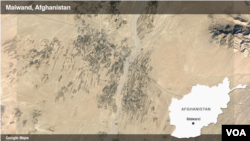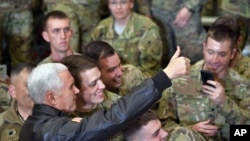Afghan officials say a suicide bombing early Friday killed at least six policemen and wounded 10 others, including an area commander, in southern Kandahar province.
The bomber rammed his explosives-filed four-wheel drive military light truck, commonly known as Humvee, into a police station in the Maiwand district. The massive blast inflicted damages to the facility and nearby civilian houses, Sultan Mohammad, the regional police commander, told VOA.
“Security guards stationed at the first entrance intercepted the Humvee, packed with around 3,000 kilograms of explosives, and opened fired to stop it, but the bomber managed to reach the second gate before detonating the explosives,” he added.
The Taliban swiftly claimed responsibly for carrying out the attack.
Mohammad acknowledged that Taliban insurgents in recent battlefield attacks in Kandahar and adjoining Helmand province have seized a number of Humvees and are frequently using them in suicide attacks against Afghan forces.
Local police sources, however, said the casualty toll was higher than the officially released figures.
Friday’s attack came hours after U.S. Vice President Mike Pence made a surprise trip to Afghanistan where he addressed American troops at Bagram Airfield and thanked them for their service.
He went on to say that the new Afghan strategy President Donald Trump announced in August is making progress on the ground.
“We've dramatically increased American air strikes. And together with our Afghan partners, we've put the Taliban on the defensive… We've targeted the Taliban’s funding as never before through renewed attacks on its drug trafficking network,” Pence added.
A Taliban spokesman, Qari Yousaf Ahmadi, in brief remarks to Pence’s assertions said: “Unannounced trips to Afghanistan by top American officials show that even after staying for 16 years they are worried about personal security.”
Earlier, Pence met with Afghan President Ashraf Ghani and Chief Executive Abdullah Abdullah to discuss the U.S. strategy and bilateral cooperation.
“I said to them what I say to you now; under President Donald Trump, the armed forces of the United States will remain engaged in Afghanistan until we eliminate the terrorist threat to our homeland, our people once and for all,” Pence said in his speech to U.S. troops at Bagram.
Ghani’s office issued a statement after the meeting, saying Pence commended the performance of Afghan forces and acknowledged the progress of Ghani’s government to “counter-corruption, promote effective governance, further the peace process and pursue regional cooperation.”
While addressing U.S. troops, Pence also reiterated President Trump’s warning to Afghanistan’s uneasy neighbor, Pakistan.
“For too long, Pakistan has provided safe haven to the Taliban and many terrorist organizations. But those days are over. President Trump has put Pakistan on notice…. Pakistan has much to gain from partnering with the United States and Pakistan has much to lose by continuing to harbor criminals and terrorists.”
Pakistan rebukes Pence
Pakistan promptly and sharply rejected Pence’s remarks, saying “externalizing blame” should be put on notice. A foreign ministry statement noted that “allies do not put each other on notice.”
“On notice should be those factors responsible for exponential increase in drug production, expansion of ungoverned spaces, industrial scale corruption, breakdown of (Afghan) governance, and letting Daesh gain a foothold in Afghanistan,” it said.
Pakistani envoy, Maleeha Lodhi, while speaking to a United Nations Security Council meeting on Afghanistan Thursday urged the U.S. and its allies to stop relying on military might to resolve the Afghan conflict, saying the policy has failed to achieve peace over the past 16 years.
Lodhi cited recent U.S. military assessments that around 40 percent of Afghan territory is either controlled or contested by the Taliban.
“And this failure cannot be explained away by alleging the existence of safe havens for the insurgency across the border. There are no such safe havens. The only havens that exist for the insurgents and for Daesh (Islamic State) and other terrorists are within the 40 percent of Afghan territory, which is outside the control of Kabul.”
She reiterated Pakistan’s call for focusing all efforts on finding a political settlement to the Afghan conflict.






